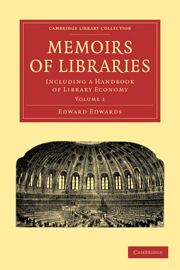Book contents
- Frontmatter
- Preface
- Contents
- LIST OF THE ILLUSTRATIONS
- Dedcation
- BOOK I THE LIBRARIES OF THE ANCIENTS
- BOOK II THE LIBRARIES OF THE MIDDLE AGES
- CHAPTER I FOUNDATION AND GROWTH OF THE MONASTIC LIBRARIES
- CHAPTER II THE LIBRARIES OF THE ENGLISH BENEDICTINES
- CHAPTER III THE LIBRARIES OF THE GERMAN, FLEMISH, AND SWISS BENEDICTINES
- CHAPTER IV THE LIBRARIES OF THE ITALIAN AND FRENCH BENEDICTINES
- CHAPTER V THE LIBRARIES OF THE MENDICANT ORDERS
- CHAPTER VI THE ECONOMY OF THE MONASTIC LIBRARIES
- CHAPTER VII DECLINE OF LEARNING IN THE MONASTERIES
- CHAPTER VIII THE DISSOLUTION OF THE MONASTERIES AND DISPERSION OF THEIR LIBRARIES
- CHAPTER IX ROYAL, NOBLE, AND PLEBEIAN COLLECTORS IN THE MIDDLE AGES
- BOOK III THE MODERN LIBRARIES OF GREAT BRITAIN AND IRELAND
- Plate section
CHAPTER I - FOUNDATION AND GROWTH OF THE MONASTIC LIBRARIES
Published online by Cambridge University Press: 05 August 2011
- Frontmatter
- Preface
- Contents
- LIST OF THE ILLUSTRATIONS
- Dedcation
- BOOK I THE LIBRARIES OF THE ANCIENTS
- BOOK II THE LIBRARIES OF THE MIDDLE AGES
- CHAPTER I FOUNDATION AND GROWTH OF THE MONASTIC LIBRARIES
- CHAPTER II THE LIBRARIES OF THE ENGLISH BENEDICTINES
- CHAPTER III THE LIBRARIES OF THE GERMAN, FLEMISH, AND SWISS BENEDICTINES
- CHAPTER IV THE LIBRARIES OF THE ITALIAN AND FRENCH BENEDICTINES
- CHAPTER V THE LIBRARIES OF THE MENDICANT ORDERS
- CHAPTER VI THE ECONOMY OF THE MONASTIC LIBRARIES
- CHAPTER VII DECLINE OF LEARNING IN THE MONASTERIES
- CHAPTER VIII THE DISSOLUTION OF THE MONASTERIES AND DISPERSION OF THEIR LIBRARIES
- CHAPTER IX ROYAL, NOBLE, AND PLEBEIAN COLLECTORS IN THE MIDDLE AGES
- BOOK III THE MODERN LIBRARIES OF GREAT BRITAIN AND IRELAND
- Plate section
Summary
“Every essential principle, almost every adjunct, and almost every vice of the Monkery of the tenth or twelfth century, may be detected in that of the fourth…. But …in the later period the religious houses contained almost all the piety and learning that anywhere existed; while in the former there was certainly as much piety without as within ‥ and much more of learning.
……In the later periods, and when nothing … existed without doors except feudal ignorance and ferocity (we speak of the monasteries of Europe), many of the religious houses were real seclusions … ….. The spiritual Monk, ‥ glad to hide himself from the railleries or spite of the lay fraternity, …. passed his hours in the pleasant, edifying, and beneficial toils of transcription. Not seldom, as is proved by abundant evidence, the life-giving words of Prophets and Apostles were the subjects of these labours.”……
Isaac Taylor, Natural History of Enthusiasm, pp. 177–219 (Ed. 1842).“Record we, too, with just and faithful pen,
That many hooded Cenobites there are,
Who in their private cells have yet a care
Of public quiet; unambitious men,
Counsellors for the world, of piercing ken;
Whose fervent exhortations from afar.
Move princes to their duty, peace or war;
And ofttimes in the most forbidding den
Of solitude, with love of science strong,
How patiently the yoke of thought they bear!”
Wordsworth, Ecclesiastical Sonnets, ii.- Type
- Chapter
- Information
- Memoirs of LibrariesIncluding a Handbook of Library Economy, pp. 83 - 99Publisher: Cambridge University PressPrint publication year: 2010First published in: 1859



